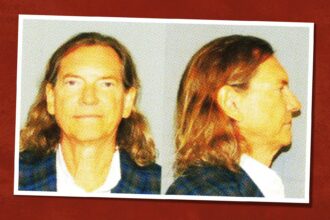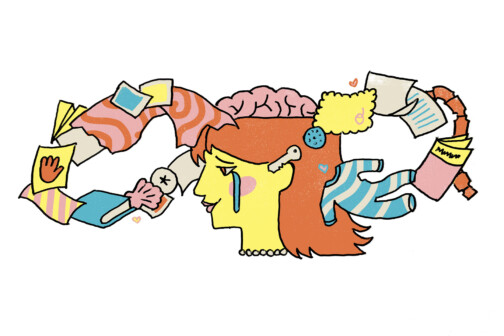It had been a full Saturday, despite the cold, blustery December weather, a good day for staying in by the fire with friends. Fortunately, we were among friends. After the breakfast dishes were cleared away, John and I had lounged around the house for a couple of hours talking about old times and telling stories to the children. They were fascinated as he got down on the den floor with them and told ghost stories and tall tales he had heard as a boy growing up in the Blue Ridge Mountains of Virginia. John’s wife Lois spent most of the morning talking on the phone to her son and daughter back home in North Carolina.
Around noon, Cheryl, my wife, took the children to a cartoon festival at SMU; John and I and Duncan, Lois’ 20-year-old son from a previous marriage, drove to the recreation center to try to scare up a basketball game. Lois stayed home. “I’m perfectly content,” she told Cheryl over the phone a couple of hours later. “I’m having a glass of brandy, and I’m reading this novel by Philip Roth called The Breast so don’t worry about me one minute.” She said something about how comfortable our house was, and she volunteered to stay with the children that night since she knew Cheryl and I had been invited to a Christmas party.
Although we had met Lois only once before, John had been almost an older brother to me. Nearly 20 years ago now, he had been stationed at the Air Force base near our home and had volunteered to help my dad with a Little League baseball team. Nineteen years old and away from home for the first time – he became, over the next two years, almost a member of the family. He needed a family, it seemed, and all of us – especially my younger brothers and I – were fond of him.
When he got out of the Air Force, he went home to Virginia, and we saw him only a couple of times in 15 years. He wrote or called occasionally, and a few years after leaving Texas, he wrote that he had gotten married – to a widow with three children, a woman sixteen years his senior. We thought it a bit odd, of course, but it was none of our affair, and didn’t those mountain people do odd things anyway.
In August, 1976, Cheryl and I, with our two young daughters, were coming back to Texas from New York. Driving through Asheville, North Carolina, I remembered that John and Lois lived in Brevaard, a few miles south of Asheville, so I called him, and he insisted that we spend the night. I hadn’t seen him in fifteen years, but he was his old self, still a bit shy, still easy-going. Lois’ children were grown, and except for the frustrations of his Job Corps teaching position, he seemed happy.
Lois was a pleasant surprise. A short, chunky woman with closely cropped brown hair and glasses, she was not at ail pretty, but she was lively, energetic, in no way the dowdy, subdued matron in her fifties I had envisioned. She greeted us with a hug as if she had known us always. I could almost see why John had married her, and, as she told Cheryl the next day, “We met at a time when he needed us, and we needed him.” When, a couple of months later, we got a letter from her saying she and John were coming through Texas in December, we looked forward to their visit.
Lois spent most of Saturday afternoon in the kitchen. She was preparing her specialty, she announced, sweet-and-sour pork, and she good-naturedly ushered Cheryl out. She was also expecting company, she said. She had remembered that her first husband, an Air Force officer who had died of cancer in the late 1950″s, had a sister who lived in Dallas. Lois hadn’t seen the woman in at least 20 years, but she had called her and invited her over. About four, an attractively dressed, middle-aged woman arrived at our door.
As afternoon became evening, Lois and her ex-sister-in-law sat in the kitchen engrossed in conversation. Lois was also making frequent trips to the liquor cabinet, and her efforts to pull the dinner together were becoming increasingly frazzled. John seemed perturbed that the woman was staying so long.
Cheryl and I left for the party about seven. When we got home about eleven, the children were asleep, John and Duncan were in the den watching television, and Lois was just clearing away the dinner dishes. Her sister-in-law was still there although she left a few minutes later.
Lois had obviously drunk quite a bit, and when John wandered into the kitchen and saw her with another drink in her hand, he tapped the glass – as if to say, “Take it easy, you’ve had too much.” The gesture angered her, and she tossed the drink into the kitchen sink. Tension flared briefly, then died down. A few minutes later, John announced he was going to bed.
They were sleeping in their camper, parked in our driveway, so when John went out, Lois went back to the den, where her son was sleeping, and sat down with The Breast, Roth’s silly little novel about a man who wakes one morning to find he has been transformed into a giant breast. Cheryl and I sat in the darkened living room in front of the fire listening to a new George Shearing album. A few minutes later, Lois came in and sat on the floor at Cheryl’s feet. She talked about how lovely the fire was, and how much she enjoyed being in our home. She also talked about her sister-in-law and how 20 years ago, they hadn’t liked each other. “Then I was thin and pretty, and she wasn’t,” she said. Now that she had put on weight and was no longer young, and the sister-in-law was doing well, Lois went on, there was no need to be jealous. “Didn’t you think she was an attractive woman?” she asked us several times. “Wasn’t she nice?”
I went to bed, and Lois continued talking to Cheryl. She talked about the music, joking that the next man she married had to love dancing because John didn’t and she did. Her conversation was a bit disjointed, and Cheryl, half asleep, didn’t always get the connection. Somehow Lois got around to telling about the radical mastectomy she had undergone five years earlier. It had been difficult, she said, but with her tenacious hold on life, she had come through, laughing and joking all the way. The doctors and nurses, she said, marveled at her spirit, her will to live. Now the five-year danger period was nearly over.
As the fire died down and the record clicked off. Cheryl stood up to go to bed. “Sleep on the couch if you want to,” she told Lois. “We’ve got plenty of extra blankets.”
“No, I’ll go on out there,” Lois said, “but leave the front door unlocked in case I change my mind.”
Lois walked out into the cold, and Cheryl, without really thinking, locked the door. Both of us went to sleep almost immediately. Perhaps ten minutes later we were awakened by a tapping at the front door. I couldn’t decide if I had heard the noise or dreamed it. Cheryl got up and let Lois in. “He’s cold as a fish out there,” she said. “I’ll sleep on the couch.”
While Cheryl found sheets and blankets for her, I raised up to see Lois in the hall outside the bathroom door. She was laughing about something. “You been running around out in the cold?” I joked. She laughed and said no, then went into the bathroom. Cheryl and I went back to sleep.
I woke about seven-thirty Sunday morning. I had planned to get to church early to practice Christmas music with the choir, but someone had beat me to the bathroom, a perennial problem in our one-bathroom house. Rachel, our five-year-old, woke up a few minutes later, and she too needed in. Twenty minutes later everyone in the house, except Duncan, was up. and the bathroom was still occupied.
I got dressed and was walking outside to get the newspaper. Cheryl met me in the living room.
“Joe, Lois has killed herself,” she said.
As my mind registered the words, it frantically cast about for some alternative meaning. There was no other meaning. After Heather, our six-year-old, had tried to get in the bathroom, Cheryl had tapped on the door, but there was no response. A weight seemed to be against the door, and she shoved inward, knowing as she did something was dreadfully wrong. Lois was slumped against the door. She had wrapped a hair-dryer cord around a metal post on the upper part of the door that keeps the door from hitting the wall, and then she had wrapped the cord around her neck and slumped down. She had obviously been dead several hours.
My mind was reeling. Take a deep breath and try to think carefully about what to do. I told myself. The girlswere pulling at my legs, begging to know what had happened. Thank God, they hadn’t seen anything, 1 remember thinking. “Something has happened to Lois,” I told them, “and 1 want both of you to go sit on the couch in the den and not move until 1 come get you.” I can still see them sitting erect and unmoving, their sober, young faces staring straight ahead.
I opened the door of the bathroom and glanced in. then went to get John. Dreading each step that brought me closer to the camper. I had no idea what to say. When I got there I handled it badly.
I banged on the door and heard him mumble, “Just a minute.” He stumbled out the door in his robe and house shoes, and I told him, “Something’s happened to Lois” – or maybe I said that before he opened the door; I can’t remember. He said nothing, but followed me into the house. Cheryl met him at the door and told him Lois was dead. While I was outside, she had been struck by the horrible thought that maybe we had been mistaken, that maybe Lois was still alive, and we were doing nothing. She steeled herself and went back in. There was no mistake.
By then Duncan was up, and he and John forced open the bathroom door. As I dialed the police, I heard from the bathroom their wrenching, agonized cries.
“I’m calling to report a suicide,” I told the woman who answered. What simple little words, I remember thinking, so totally inadequate to convey the ghastli-ness of what had happened. Next I called my brother, who lives in Dallas, to come get the girls.
My brother arrived within minutes, almost as quickly as the two police cars and three fire trucks. Cheryl ushered the officers into the bathroom where John and Duncan had taken Lois’ body down and laid it on the floor. I saw out the window that a friend who a few days earlier had arranged to borrow our van had driven up. As I walked out to meet him on this crisp, sunny morning, I wanted to call to Cheryl and keep going. Our house had been violated, and I did not want to be there. Neighbors were standing in their yards dreading to find out what had happened. The gray-haired little woman next door, whose husband had died of a heart attack only a few months earlier, was standing on her front porch literally wringing her hands. I assured her all of us were okay.
Inside, two police officers, three plain-clothesmen, and two firemen crowded into the front part of our small house. “Who called this in as a suicide?’” one of the uniformed officers wanted to know. I told him I had. “Why did you call it a suicide?” he asked. What a silly question, I thought; what else could it have been? Then I realized that he had found Lois’ body on the floor after John and Duncan had taken her down. Our explanation seemed to satisfy him.
In the kitchen, two of the plainclothes officers questioned John. He had been asleep when she came to the camper, he said, and he vaguely remembered her saying something, but he couldn’t remember what. “Come on to bed. and we’ll talk about it in the morning,” he remembered saying, then he heard the door close, and he had gone back to sleep. “If only I had been awake,” he kept saying, shaking his head and hitting the table softly with his fist. No, he said, there had been no prior attempts. Why did it happen now. he kept asking himself out loud, just when they had plans for a new life. They had found a farm in Tennessee, he had quit his teaching job, and they were negotiating to buy the place. They were both eager to get started. He shook his head and stared at a cup of coffee on the table. Duncan, a tall, blonde, good-looking kid, sat by himself in the den, a look of disbelief on his face. Several times the day before, his mother had tried to hug him, he told police, and each time he had pushed her away.
An hour later, a field investigator from the county medical examiner’s office arrived and then the ambulance, and Lois’ body was taken to the morgue. My parents arrived from Waco, and Cheryl and I went out for some lunch. We sat staring at each other over two tasteless orders of fish and chips. Had it really happened? Was it just a nightmare? – all the old cliches kept running through our minds.
And why in our house? Did she have something against us? Could we have somehow prevented it? And why, out of all the books in our library, did I suggest she read The Breast?
I was struck with how frighteningly inscrutable we all are. Admittedly, we didn’t know Lois well, but we had been in the same house with her for two days; how could we have been so totally insensitive to her distress? A person that desperate, I remember thinking, could have done anything, could have been contemplating violence to herself or someone else – my children, for instance – and I would have been stupidly unaware. Why do we dare trust anyone, 1 wondered.
Late that evening, as dusk settled over Dallas, I drove John to Parkland to sign the death certificate. Arrangements with a mortuary to fly the body back to North Carolina were confirmed, an attendant gave him an envelope containing Lois’ two rings and her watch, and that was all. As we drove home, he said how sorry he was that it had to happen, that it had to happen at our house. He hoped the children would be okay. All he wanted now, he said, was to leave as soon as possible.
It was dark when we got home. John and Duncan left for North Carolina soon afterward. Cheryl and I drove over to my brother’s to pick up the children. We sat on the bed with them and explained as best we could what happened. We tried to answer their questions, and they seemed satisfied, although one question Rachel kept asking, we couldn’t answer: “Why did Lois want to do that, Daddy?”
The next morning Cheryl left for work, the girls went to school, and I stayed home to work on a story I was writing. It had been a difficult night. Cheryl had finally broken down while we were still at my brother’s. Although she felt better after releasing the pent-up emotions, we both dreaded going home – but we knew we had to. We got the children to bed with no trouble, and like two frightened children ourselves, we had clung to each other throughout the night.
I sat at the dining room table trying to write, but I couldn’t concentrate. I wanted to leave but knew I shouldn’t, so I went into the living room, turned the radio dial to WRR-FM, and sat down to read. I was listening to Beethoven, I think, when an eerie thing happened. Static suddenly drowned out the music. A rock station broke in over WRR. I heard the lyrics of a popular song, something like, “It was a terrible thing to do …” I felt the hair on the back of my neck rise. Beethoven came back, and I tried to read. When the same lyrics broke in again, I made for the front door as fast as I could.
It was several weeks before the horror of what we had experienced began to fade, before we again felt comfortable in our house. The girls seemed okay – they’ve asked about Lois maybe twice over the past year – but Cheryl and I sometimes dreaded coming home in the evening; as ridiculous as it sounds, we caught ourselves avoiding the bathroom as often as possible. But time passed, and gradually things returned to normal. Two lively children in the house helped, as did visits from a lot of friends and a big Christmas. We wanted our house to be what it always had been – a place where love and affection prevailed – and with a little more conscious effort than usual, it became that.
How John and Duncan fared, I can’t say. We had two brief letters from John earlier this year, but he didn’t tell us much. In the second letter, he wrote that he had just about pulled himself together, but that Duncan had been in some kind of scrape with the law – although they were about to get it worked out. There was nothing in the letter about why Lois might have done it.
Lois was one of 179 people in Dallas County who took their own lives last year. There may in fact have been perhaps 5 to 10 percent more, but some deaths are difficult to substantiate as suicides. “Why a person takes his own life, we never really know,” says Dr. Charles Petty, Dallas County’s medical examiner. “Perhaps the individual doesn’t know.” Though we always speculate, as I still do at times about Lois.
Alcohol, I suspect, had something to do with triggering the act, although her drinking doesn’t explain more basic motives. I wonder how much her sister-in-law’s visit had to do with her death, what kind of memories haunted her? Why did she call her sister-in-law in the first place, and why did she talk so long on the phone to her son and daughter? Perhaps the mastectomy had something to do with it. John told us the next day that despite what she had told Cheryl, Lois had suffered a great deal – both physically and emotionally. I wonder how much her husband’s seeming rejection that night had to do with it. It must have been difficult anyway to be 54 and married to a still youthful-looking man of 38. And there’s the nagging suspicion that there was something else – what, I don’t know – something John knew but wasn’t telling.
An offhand remark by one of the police officers that Sunday morning also sounded plausible. “Well, it’s started again this year,” he said. “When we get close to the holidays, we start getting calls.” Christmas – with the unnecessary presents, the obligatory cheerfulness, the heightened expectations – is often the most depressing time of the year for many people, and last year more people in Dallas County killed themselves in December than in any other month. (There were 24 December suicides last year: September was the next highest month with 23.)
But the holiday/suicide correlation does not always hold. In 1974, for instance, there were more suicides in Dallas County in September and March; in 1973, it was February and August. As Calvin J. Frederick of the National Institute of Mental Health pointed out to a conference on suicide at SMU recently, “There does seem to be an increase in depression, which is relatively unmistakeable during the holiday period, but the month of December is frequently the lowest. The reason for this is that depression does not always result in suicide, but in depressed feelings or suicide attempts. The suicidal act itself may be delayed for two, three, or four months.” The person who commits suicide because of holiday depression, in other words, may not end up as a suicide statistic until March or April.
Cyl Reed, who spends her Tuesday nights answering the phone for Suicide Prevention of Dallas, Inc., sees holiday suicide as part of a more pervasive phenomenon. She calls it the Great Expectations syndrome. “We have these great expectations in our lives,” she says, “the holidays, for example. We pay the kids’ plane fare home, we buy expensive gifts, and then when the family isn’t brought back together as we expected, we get depressed. We build ourselves up for a big letdown.”
Cyl Reed works the nine-to-one Tuesday night shift at Suicide Prevention, invariably the busiest night of the week. Sometimes as many as twenty calls come in during the four-hour period. That too, she believes, is part of the Great Expectations syndrome. “People live for the weekend,” she explains, “hoping to hang on until Friday when everything will get better. They throw themselves into the weekend, and it doesn’t measure up to what they expected, and then Monday they again have to face the world. Everybody expects to feel bad on Monday, but by Tuesday night those who have really been in the depths are getting back down into it even more deeply.”
The fortunate ones find help. Suicide Prevention, Inc. gets approximately 1000 calls a month. Some callers simply need someone to talk to; others are genuinely afraid they are about to kill themselves.
And then there are those who call no one.
Four people in Dallas killed themselves on Thanksgiving Day this year. “That’s unusual,” says Dr. Petty, the medical examiner. “We sometimes see two, but I don’t recall seeing four. I suppose the sense of isolation, the sense of being left out is greater at that time of year, but we never know for sure.”
And that is where a discussion aboutmotives must always end. We never really know. A. Alvarez, in his book TheSavage God, put it this way: “In otherwords, a suicide’s excuses are mostlycasual. At best they assuage the guilt ofthe survivors, soothe the tidy mindedand encourage the sociologists in theirendless search for convincing categoriesand theories. They are like a trivial border incident which triggers off a majorwar. The real motives which impel a manto take his own life are elsewhere: theybelong to the internal world, devious, contradictory, labyrinthine, and mostlyout of sight.”
Get our weekly recap
Brings new meaning to the phrase Sunday Funday. No spam, ever.
Related Articles

Local News
Bill Hutchinson Pleads Guilty to Misdemeanor Sex Crime
The Dallas real estate operator and erstwhile reality TV star will serve time under home confinement and have to register as a sex offender.
By Tim Rogers

Restaurants & Bars
The Best Japanese Restaurants in Dallas
The quality and availability of Japanese cuisine in Dallas-Fort Worth has come a long way since the 1990s.
By Nataly Keomoungkhoun and Brian Reinhart

Home & Garden
One Editor’s Musings on Love and Letting Go (Of Stuff, That Is)
Memories are fickle. Stuff is forever. Space is limited.
By Jessica Otte


